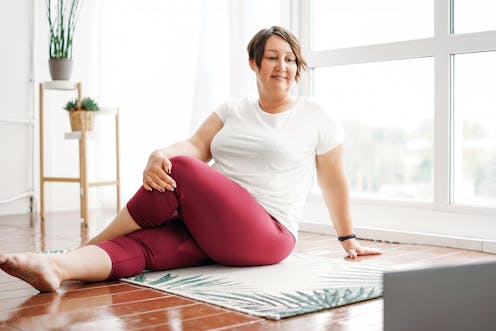How often do young women die of heart attacks and what can you do to improve your heart health?
- Written by Sally Inglis, Professor, Heart Foundation Future Leader Fellow, IMPACCT, Faculty of Health, University of Technology Sydney

The news of 52-year-old Senator Kimberley Kitching’s death from a suspected heart attack is a tragic loss that has shocked many women.
At a time when the community was grappling with the sudden death of Shane Warne – and we asked the men in our lives to pay attention to their heart health – Kitching’s sudden death served as a stark warning of the risk of heart disease to women.
These risks are often overlooked, particularly in younger women, and the warning signs may differ from those typically seen in men.
What’s the risk of having a heart attack?
Heart disease is a leading cause of death and disability in both women and men in Australia.
The risk of an acute event (including heart attack) increases with age for both men and women: from five per 100,000 for women aged 25–34 (13 per 100,000 for men) to 2,100 per 100,000 for women aged 85 and over (2,900 per 100,000 for men).
Around 14% of women aged 45-74 years are at high risk of a heart attack over the following five years.
Across all age groups, 20 Australian women die from heart disease each day.
How do women experience heart attacks?
Women’s experience of a heart attack can be different to men’s – they are less likely to have chest pain.
Women are more likely to suffer shortness of breath and have pain between the shoulder blades. They’re also likely to have nausea or vomiting.
We often hear of women delaying calling an ambulance or waiting to see if the discomfort eases before they seek care.
Women are also less likely to receive timely treatment.
Read more: Women who have heart attacks receive poorer care than men
Effective treatment is available in hospital. But delaying treatment may reduce the benefit of therapies and lead to poorer outcomes.
How to reduce your risk of heart attacks
Taking steps to reduce the risk of heart disease and a heart attack is important for all women. Here are four things you can do today:
1. Get your heart health checked
Australians aged 45 years and older and Indigenous Australians aged 30 years and older can have a Medicare-funded heart health check with a GP.
During this appointment, your GP will calculate your risk of having a heart attack in the next five years. This will be done using information from your medical history, family history, lifestyle factors, and measurements such as your blood pressure and a blood test.
Tests may also include an ECG (electrocardiogram) and CT calcium score. An ECG looks at your heart rhythm, while a CT calcium score measures the amount of calcium inside the walls of your heart’s arteries. This can indicate a build-up of plaque (a blockage) inside the blood vessel that could increase your risk of a heart attack.
Based on your risk score, the GP will be able to provide treatment advice to reduce your risk of a heart attack. If the risk score is high, they may recommend specific medicines. At lower risk scores, lifestyle modifications – such as changes to diet, exercise and quitting smoking – may be recommended as the initial approach.
Read more: Women have heart attacks too, but their symptoms are often dismissed as something else
2. Quit smoking
Smoking substantially increases the risk of heart disease. It narrows and clogs the blood vessels, reducing blood supply and oxygen throughout the body. Smoking also makes the blood vessels stiff and unable to stretch.
People who smoke are four times more likely to die of heart disease and three times more likely to die of a heart attack.
Stopping smoking leads to better overall health at any age, and especially heart health. Support to stop smoking is available through Quit Line – it’s never too late to stop.
3. Get moving
Exercise has many physical and mental health benefits, including lowering blood pressure and cholesterol.
If you have heart disease, physical activity can help you manage the condition, lower the risk of type 2 diabetes and keep your weight in check. Achieving a healthy weight also reduces your risk for heart disease.
Walking is a great way to start exercising and can be done with a friend to provide peer support, or within community walking groups.
4. Swap unhealthy food
Swap out less healthy food for healthier options, including vegetables and fruits, and cut down on salt and soft drinks.
Making changes can be challenging, but start with a few achievable changes and low-cost, healthy recipes.
Improving access to care
Access to preventative care, specialist support and rehabilitation following a heart attack is critical to reducing death and disability of heart disease.
More can be done to improve access to care, especially in priority groups such as women from culturally and linguistically diverse communities, Aboriginal and Torres Strait Islander women, and women living in rural and remote Australia.
Better access to care requires ensuring primary care workforce capacity, especially in rural and remote areas, as well as funding and policies to increase access to primary care nurses, nurse practitioners and cardiac rehabilitation services.
Telehealth is a valuable tool to improve access to GPs and specialist cardiac services, especially in rural and remote areas.
All Australians have had a wake-up call to be aware of their heart health. Reducing your risk of heart disease begins with making a GP appointment for a heart health check to get personalised support to live a healthy life.
Authors: Sally Inglis, Professor, Heart Foundation Future Leader Fellow, IMPACCT, Faculty of Health, University of Technology Sydney



















